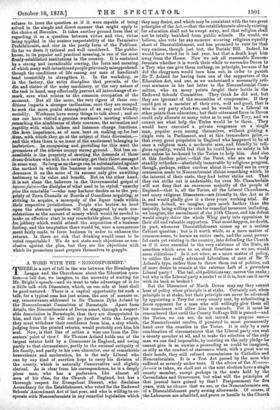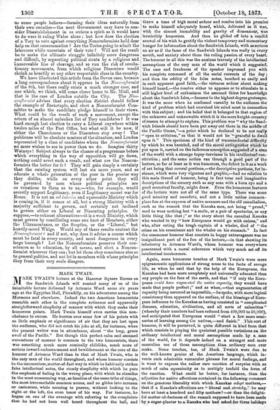A WORD WITH THE "NONCONFORMIST."
THERE is a sort of lull in the war between the Birmingham League and the Churchmen about the Education ques- tion—a lull due, we imagine, to the necessity of waiting for Mr. Bright's speech—and we want to take advantage of it for a little talk with Dissenters, which, on our side at least shall be good-natured. There is a capital opportunity for such a talk, for a typical case has just arisen, the sort of menace or, say, remonstrance addressed to Sir Thomas Dyke Acland by the Nonconformist Committee of Barnstaple. Apart from details, the Nonconformists of Devon assert, through a respect- able Association in Barnstaple, that they are disappointed in him, and that if he will not go further with the League, they must withdraw their confidence from him, a step which, judging from the printed returns, would probably cost him his seat. Now, is that line of action a wise one from the Dis- senters' point of view ? Sir Thomas Acland holds one of the largest estates held by a Commoner in England, and owing partly to that circumstance, partly to the unusual antiquity of his family, and partly to his own character, one of remarkable benevolence and moderation, he is the only Liberal who can by any kind of exertion hope to carry his division of the county, which is naturally Conservative and slightly clerical. As is clear from his correspondence, he is a deeply pious man, who has a preference, like almost all men of his class, for the Church of England, but has a thorough respect for Evangelical Dissent, who disclaims Ascendancy for the Establishment, who voted for the Endowed Schools' Amendment Act of last year, and who is willing to co- operate with Nonconformists in any remedial legislation which they may desire, and which may be consistent with the two great principles of the Act,—that the establishments already existing for education shall not be swept away, and that religion shall not be totally banished from public schools. He would, we believe, also vote for any measure securing religious equality short of Disestablishment, and has promised to vote for that very curious, though just test, the Burials' Bill. Indeed, he would have voted for it last year, but that a death kept him away from the House. Now we ask all reasonable Noncon- formists whether it is worth their while to surrender Devon to a Tory who can give them nothing, on principle, because if he did the clergymen would turn him out, in order to punish Sir T. Acland for having been one of the supporters of the Education Act, and one, as we understand a necessarily reti- cent sentence in his last letter to the Nonconformist Com- mittee, who on many points fought their battle in the Endowed Schools' Committee. They think he did not, but they are ignorant of the necessities of compromise. If they could put in a member of their own, well and good, that is wise in any party whakver, and he would be a Liberal on other points than education; but their uttermost force in Devon could only alienate so many votes as to seat the Tory, and we cannot see what help the Tories would be to them. They would have executed a private vengeance on a single man, popular even among themselves, without gaining a single vote in Parliament, and at this tremendous price,— that every great proprietor in England who happened to be at once a religious man, a moderate man, and friendly to reli- gious equality, would feel that he could have no safety in his seat unless he beckoned to the Tories to help him. And also at this further price,—that the Peers, who are as a body steadily orthodox—absolutely immovable by religious progress, though, perhaps, rather careless about it—would see in every concession made to Nonconformist claims something which, in the interest of their caste, they had better strike out. That they can strike out is undeniable, for even Mr. Chamberlain will not deny that an enormous majority of the people of England—that is, all the Tories, all the Liberal Churchmen,. and many religious Dissenters—are friendly to the Act as it is, and would gladly give it a three years' working trial. Sir Thomas Acland, we imagine, goes much farther than the majority, being willing to vote for remedial measures, including, we imagine, the amendment of the 25th Clause, and his defeat would simply drive the whole Whig party into opposition to their old and valuable supporters. That must happen, no doubt, in part, whenever Disestablishment comes up as a serious Cabinet question ; but is it worth while, as a mere matter of common-sense, to harass an entire caste, and the most power- ful caste yet existing in the country, into defending the Church as if it were essential to the very existence of the State, an assertion which, even to us, stout Erastians as we are, would seem ridiculous ? Is it not wiser, as a mere matter of policy, to utilise the really advanced Liberalism of men of Sir T. Acland's type, rather than to throw them out of politics, out of mere desire to remain at the extreme Left of a powerless
Liberal party The tail, old politicians say, moves the snake; but why is the Liberal party a snake? or if it is, how can it move with its back so broken ?
But the Dissenters of North Devon may say they cannot hear of policy when principle is at stake. Certainly not, when principle is at stake, but their principle can never be advanced by appointing a Tory for every county seat, by substituting a fierce opponent for a man who will willingly give them all his conscience will allow him to concede. For it must be remembered that until the County Suffrage Bill is passed—and the Tories, we can see, do not intend to propose one— the Nonconformist resolve, if persisted in, must permanently hand over the counties to the Tories. It is only by a rare combination of circumstances that the Liberal party can seat a county member at all, and to make the selection of the only man we can find impossible, by insisting on the only pledge he cannot give is as unwise a proceeding as could be imagined, as silly as the conduct of statesmen when, with a great war on their hands, they still refused commissions to Catholics and Nonconformists. It is a Test Act passed by the men who suffered so severely under tests. If the advice of the Noncon- formist is taken, we shall not at the next election have a single county member, except perhaps in the seats held by the Cavendishes and Grosvenors, but what will the principles of that journal have gained by that ? Postponement for five years, with no chance that we see, or the Nonconformists see, of a Disestablishment party arising afterwards. Of course, if the Labourers are admitted, and prove as hostile to the Church
As some people believe—forming their ideas naturally from their own counties—the next Government may have to con- sider Disestablishrnent in as serious a spirit as it would have to do were it ruling Wales alone ; but how does the election of a Tory to vote against everything Nonconformists hold dear help on that consummation ? Are the Tories going to admit the labourers while uncertain of their vote ? Will not the result be to make the ultimate struggle infinitely more dangerous and difficult, by separating political strata by a religious and immoveable line of cleavage, and so run the risk of revolu- tionary movements, from which religious Dissenters would shrink as heartily as any other respectable class in the country.
We have illustrated this article from the Devon case, because a long correspondence about it appears in the Nonconformist of the 8th, but' there really exists a much stronger case, and -one which, we think, will come closer home to Mr. Miall, and that is the case of London outside 'the City. The Non- -conformist advises that every election district should 'fo]low the example of Barnstaple, and elect a Nonconformist Coxn- mittee to make the candidate pledge himself to their views: What could be the 'result of such a movement, except the return of an almost unbroken list of Tory candidates ? It was hard enough last election to carry a Liberal anywhere within twelve miles of the Post Office, but what will it be now, if either the Churchmen- or the Dissenters stay away ? The publicans will be absolute masters of the situation, and London represented by a class of candidates whom the Noncmfornsisi no more wishes to see in power than we do. Imagine thirty Watneys 1 Subject always to the chance of a programme before which everything in the way of opposition will go down, 'nothing could avert such a result, and what are the Noucon- formists the better for it ? They will gain simply a certainty -that the existing system will last six more years, and so educate a whole generation of the poor in the precise way they dislike, while on every other point they will be governed by men whose political principles are as vexatious to them as to us,—who, for example, would secretly support Legitimacy, even if Legitimacy meant war for Rome. It is not an ad interim and squeezable Ministry which is coming in, if it comes at all, but a strong Ministry with a majority sufficient to govern, and certainly not inclined to govern either on Liberal or Dissenting principles. Or suppose,—to exhaust alternatives—it is a weak Ministry, which must govern by conciliating some one knot of Members, either the Ultramontanes, or the Sceptics, or the "Liberal," but heavily-ac' red Whigs. Would any of those results content the Nonconformist ? and if not, why does it advise a coarse which must be fatal in everylcounty, and most dangerous in every large borough ? Let the Nonconformists preserve their con- sciences as to education, by all means, and elect a Noncon- formist wherever they can; but let them obey conscience also as to general politics, and not let in members with whose principles they from their very souls disagree.



































 Previous page
Previous page